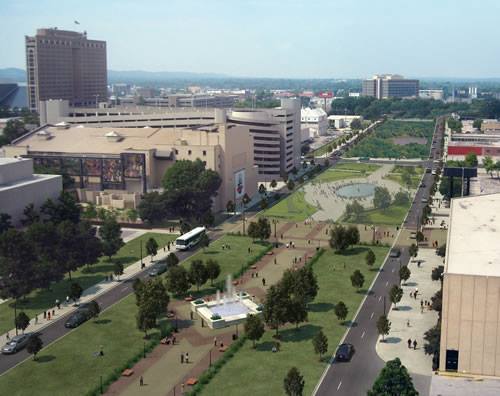Downtown freeways are unmitigated disasters for cities. They ruin the development potential of central city neighborhoods and create dead zones that divide downtown areas. That's why Milwaukee, San Francisco, New Orleans, Niagara Falls, Oklahoma City, New Haven and Syracuse have either torn them down or are seriously considering it.

But Birmingham, Alabama, is on track to take just the opposite approach. Under the advice of the Alabama Department of Transportation, Birmingham plans to widen its elevated downtown highway, I-20/59. ALDOT wants to spend $65 million widening 18 miles of this highway to six lanes at all points, based on the projection that traffic will grow 4 percent annually for the foreseeable future. (The project's total cost, including redecking the highway, is $300 million.) The idea is to speed traffic through downtown on "Alabama's busiest highway." ALDOT also wants to widen a local road and remove some on ramps.
John Norquist, president of the Congress for the New Urbanism, recently criticized ALDOT's proposal in local news site The Weld, saying “it definitely will not do anything good for Birmingham.”
Public opposition to the project is growing, even while political opposition has been lacking. More than 500 people have joined a Facebook group called Rethink 50/29. According to Mark Kelly, publisher of The Weld, the freeway revolt is attracting a growing number of businesses:
...opposition to the ALDOT plan is growing, slowly but surely. It started with a few people in the Norwood neighborhood and some agitators in the Facebook group I Believe in Birmingham. It came to include the board of directors of the Birmingham-Jefferson Convention Complex, at least 100 businesses in the Norwood Industrial District just south of I-20/59 and a group that began meeting on a weekly basis back in May and expanded into the Rethink 20/59 effort. Now, while not technically opposed at this stage, a small, informal group of influential business and civic leaders is quietly convening a meeting this week to “discuss…interests or concerns about [ALDOT’s] proposal or alternative plans.”

What the opposition is sorely lacking at this point, Kelly says, is the support of Mayor William Bell. Almost 1,000 people have signed a petition asking the mayor to oppose the project. Kelly says the mayor's whole legacy could rest on how the situation plays out, as could Birmingham's future as a competitive, 21st century city. But so far, the mayor has been silent.
Meanwhile, local Councilor Johnathan Austin has been the sole political voice in Birmingham to speak out against the project. He told The Weld recently:
ALDOT wants to take a bad idea and make it worse. They want to rebuild a bridge through downtown, when every major city in the country is looking for alternatives to building elevated highways. This is our city, and ALDOT should be working in unison with us, not trying to shove something down our throats because it suits them.
A $700 million alternative proposal to sink the highway was dismissed by state leaders as "too expensive." Perhaps if transportation officials eliminated plans for the $4.7 billion Northern Beltline, a literal highway to nowhere, there would be more money to invest in the core of the city.





